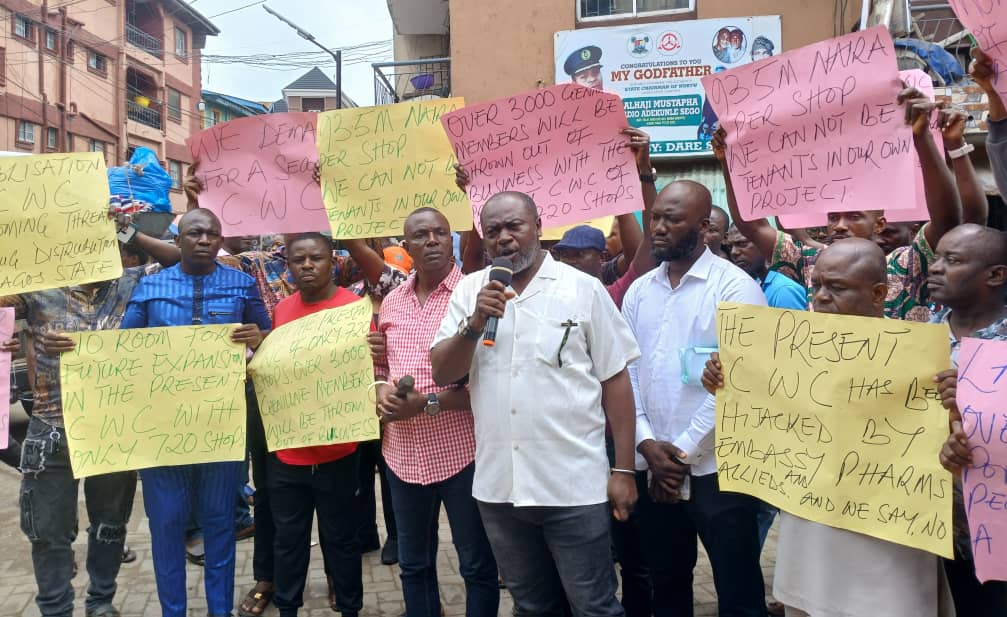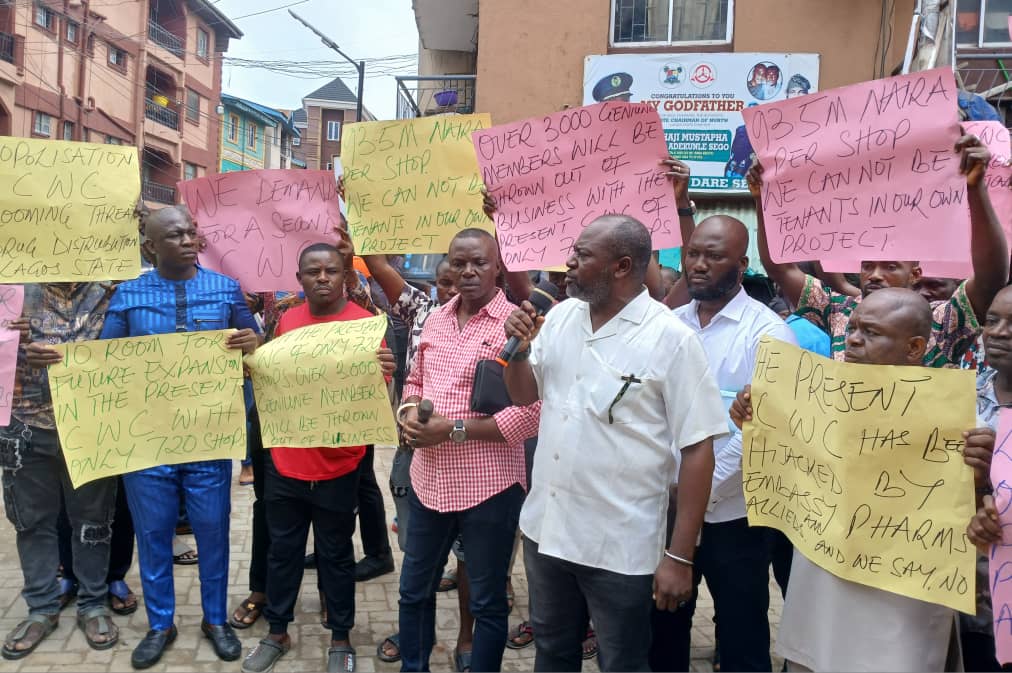
The Chairman of NAPPMED, Liberation Zone, Mr Osita Nwajide addressing pressmen at the protest on Tuesday. (Photo credit: Chinyere Okoroafor)
……appeals to Tinubu, Sanwo-Olu for second CWC in Lagos
Nigeria’s medicine supply chain may be heading for a major crisis as
Pharmaceutical marketers in Lagos on Tuesday raised alarm over the alleged hijack of the Coordinated Wholesale Centre (CWC) project by a few powerful individuals and entities
The Lagos Island-based marketers, under the aegis of the Nigeria Association of Patent and Proprietary Medicine Dealers (NAPPMED), say the once-promising drug distribution hub, meant to sanitise and regulate the chaotic open drug markets, has been transformed into a private monopoly leaving over 3,000 legitimate medicine dealers sidelined.
At the heart of the controversy is the Ijora-Badia CWC, which was originally conceived as a public health reform to ensure safe, quality, and regulated drug distribution.
But stakeholders say it has now been commandeered by vested interests who are allegedly using financial muscle and political connections to edge out authentic operators.
Speaking at the protest ground, the Chairman of NAPPMED, Liberation Zone, Mr Osita Nwajide said the project has been hijacked, “We medicine dealers paid for that land under the Lagos State Medicine Dealers Association (LSMDA). But today, we have been pushed aside. We are demanding either our land back or a second CWC.”
According to Nwajide, over 920 marketers individually contributed between ₦100,000 and ₦1,000,000 each as far back as 2011 to purchase the land for the CWC, with hopes of operating in a regulated space.
However, with shop prices now pegged at a staggering ₦93.5 million per unit, he said the very marketers who funded the vision have been priced out.
“They are asking us to pay ₦93.5 million for a shop from June to December. How many of us can afford that? Many of us are small to medium-scale operators. It’s an impossible demand,” Nwajide lamented.
Industry observers warn that the monopolisation of the Lagos CWC threatens not only the economic survival of legitimate drug marketers but also the integrity of Nigeria’s drug distribution system.
“With only 720 shops available and more than 3,000 displaced marketers, the result is obvious: market exclusion, supply distortions, and the risk of black-market proliferation,” Nwajide said.
Already, Lagos residents are beginning to feel the heat. Reports indicate rising drug prices, reduced product variety, and growing cases of stockouts across retail pharmacies, signs of a supply chain under stress.
Nwajide warned that If the association demands are not met, “we will see an increase in black-market drug distribution in Lagos. This could lead to dangerous shortages, infiltration of counterfeit drugs, and a full-scale public health crisis.”
NAPPMED leaders allege that the CWC has not only been monetised but turned into a pseudo-private company.
“They are now selling shares amongst themselves. How do you sell private company shares without public disclosure or stock exchange listing?” Nwajide queried.
“Those who built this project have been excluded, while a handful of connected individuals are now listed as persons with significant control.”
Documents cited by the group show that the project’s governance has shifted away from collective oversight into the hands of select business interests? many of whom are not licensed pharmaceutical operators.
To salvage the situation, the marketers are calling on the Federal Government, Lagos State Government, and the Pharmaceutical Council of Nigeria (PCN) to immediately initiate plans for a second CWC in the state.
They insist that the proposed second Coordinated Wholesale Centre must prioritise affordability, with shop units ideally priced between ₦35,000 to ₦40,000 per annum, and be governed through a transparent and inclusive system under the strict oversight of regulatory bodies.
Additionally, the centre should have a zonal spread to ease congestion and improve access across Lagos, as well as incorporate digital traceability systems to monitor drug movement and ensure accountability throughout the supply chain.
“Lagos is a mega city of over 25 million people. It has two seaports and two airports. One CWC with just 720 shops is grossly inadequate,” Nwajide said.
The group proposed that the second CWC be located in Lagos Island, preferably in areas like Ibeju Lekki and it environs, where they say sufficient land is available and logistics are more favourable.
The marketers have taken their appeal directly to the nation’s top leadership.
“We are passionately appealing to President Bola Tinubu, a son of Lagos, and Governor Babajide Sanwo-Olu, to come to our rescue,” Nwajide said.
“Give us a second CWC that is people-focused and fairly distributed. If done right, Lagosians will enjoy equitable access to affordable and quality medicines.”
The CWC was once hailed as a revolutionary solution to Nigeria’s perennial drug market chaos, aiming to eliminate the open drug markets notorious for counterfeit and substandard medicines.
But without urgent intervention, experts warn that the CWC risks becoming a symbol of exclusion, rather than progress.
“If we allow a monopoly to take root here, the consequences will be grave: rising costs, declining availability, and the erosion of public trust in our medicine supply system.” Nwajide concluded.
